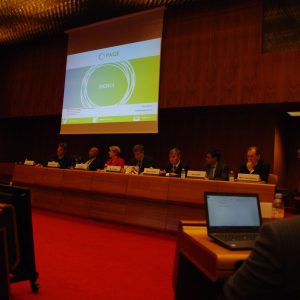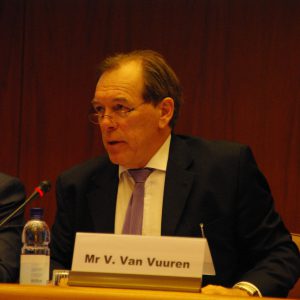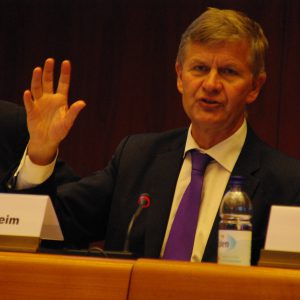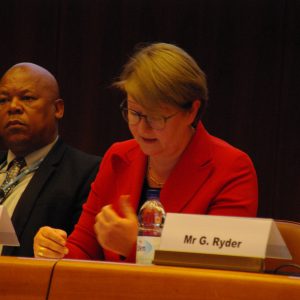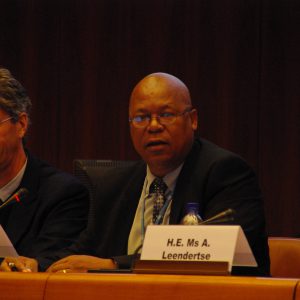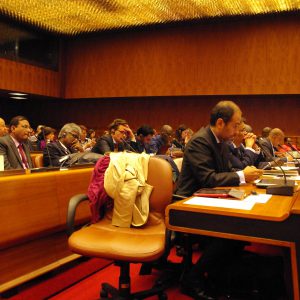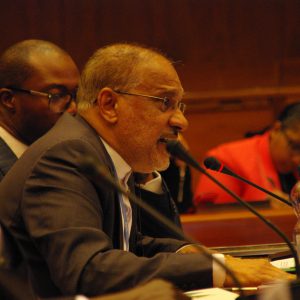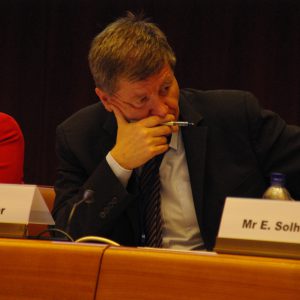Événement
High Level Session | Inclusive and Sustainable Economies Powering the Sustainable Development Goals

This event was convened under the Partnership for Action on Green Economy (PAGE) and organized within the framework of the Geneva Environment Network, at the International Labour Organization on Thursday 4 May.
PAGE brings together five UN agencies – UN Environment, International Labour Organization, UN Development Programme, UN Industrial Development Organization, and UN Institute for Training and Research – whose mandates, expertise and networks combined can offer integrated and holistic support to countries on environmentally sustainable and socially inclusive green economies, ensuring coherence and avoiding duplication.
This high-level dialogue aimed to present and discuss the PAGE collaboration in 13 countries, following the 2nd PAGE Ministerial Conference held in Berlin from 27 to 28 March 2017, and in view of the forthcoming 3rd Meeting of the UN Environment Assembly in December. In addition to providing an overview of PAGE’s work in existing country partners, the session also explored the future of the Programme in advancing the implementation of the 2030 Agenda on Sustainable Development, supporting global action against climate change and also highlighted the importance of initiatives such as PAGE in the framework of the Future of Work.
Agenda
10:00
Welcome remarks by Guy Ryder, Director-General, International Labour Organization
10:05
The PAGE partnership by Steven Stone, Chief, Economics and Trade Branch, UN Environment
10:15
Opening statements, invited speakers:
Erik Solheim, Executive Director, UN Environment
H.E. Amb. Antje Leendertse, Ambassador, Permanent Representative of Germany
H.E. Amb. Nozipho Joyce Mxakato-Diseko, Ambassador Extraordinary and Plenipotentiary, Permanent Representative, South Africa
Nikhil Seth, Executive Director, UN Institute for Training and Research
10:45
Open discussion
11:25
Summary and closing by Guy Ryder, Director-General, International Labour Organization
The event was held with simultaneous interpretation English – French
Key elements of the discussion
Guy Ryder, ILO Director General
- Highlighted PAGE as a response to the 2030 Agenda and a way to ensure a “just transition” to green economies
- “For the ILO the greening of economies can and must be a driver of sustainability in job creation because without positive employment results the readiness of governments to embark on profound structural transformation risk being limited”
- “As a country-driven program, PAGE can, we hope, offer a meaningful contribution to deliver on urgent and essential demands of people and communities from all over world; deliver a safe environment, have access to decent work opportunities, to realize their aspirations.”
- “There is a decisive movement in the world that the future has to be sustainable. That the future is green jobs.”
- Much work remains to be done. “This is a trickier process than the generalities might lead one to believe. When one goes from the generalities to the granularities that member states and communities are dealing with we realize that we have specific challenges to meet” This is where PAGE with its concrete hand-on approach can best serve .
- The market is giving the right signals but it would be mistake to believe that we should leave this matter to the market and investment alone, a more hands-on approach is needed
- “PAGE embodies the right formula to connect the national to the international and to bring the different actors together”
- “Mindsets matter-internationally and nationally
Steven Stone, UN Environment Green Economy Chief
- How do we create prosperity and economic opportunity without jeopardizing our environment and natural resources?
- Active ingredient of PAGE is political commitments that underpin sustainability. PAGE merely brings policy analytics.
- Government policy and upstream decision determine how money is invested by the private sector.
- PAGE’s ethos is to work upstream. Inspire, inform, and enable.
Erik Solheim, UN Environment Executive Director
- The market anticipates future and we are seeing current investments in green energy and technology.
- Shared example of South-South cooperation between China and India in going green within the lighting industry and there are many more examples that show a clear direction toward a greener futur.
- “The jobs are going green”… we “need to get out of the old fashioned idea that either you provide economic development or you provide for the environment”
- The world needs a “firm integration of economic and environment agendas”
- Need to look into how to make the social transition of programming, with a focus on reeducation and retraining to smooth the transition to a green economy.
- “Jobs are now in the environment sector. However not for the same people, we need to look at social cost”
Nikhil Seth, UNITAR Executive Director
- “interconnected matrix of human aspirations and human concerns on the environment , society, economic growth, full employment, social advancement”
- Countries want smart policies that meet the aspirations of their citizens
- Page brings sectoral expertise for smart policy
- PAGE has a combined funding model which “shows the UN at its unified best, delivering a response to the requests that come to it from member states”
- Example of Jiangsu province in China where PAGE identified green indicators. It was so successful that the PAGE model was replicated in two other provinces.
- “It is the era of implementation, we have gone way beyond the time of conceptualization”
- The problem of green economy is in operationalizing, not conceptualizing
- PAGE is a “model for reaching the SDGs and on making countries follow smarter policies, not only the governments all actors in society”
- UNITAR’s programming is meant to change people’s mindsets
H.E. Amb. Antje Leendertse, Ambassador, Permanent Representative of Germany
- There are several ways to follow up to the PAGE conference in Berlin. PAGE must first and foremost continue policy advice and outreach. Need to produce more success stories and make available to the international community to inspire others.
- The next conference in South Africa will build on PAGE’s work.
- Calls for more international cooperation for a transition to green economy.
- Highlighted challenges of implementation.
- Germany used PAGE Exchange presidency fora to influence sustainablility agenda
Lizwi Eric Nkombela, Councelor South Africa Permanent Mission
- Green growth needs participation of communities to address employment and poverty, food security and climate change to reduce inequality
- South Africa has produced many policies for sustainable housing, agriculture, transportation to ensure an equitable transition to a low carbon environment
- Investment the energy sector for 1.1 Billion Green Fund of SA government
- African Union has identified inclusive growth, food security, resource scarcity and environmental risks
- Build on natural assets, enabling polices and institutions,
- Growing support amongst African governments for a green economy, but lack the capacity to do so.
- South Africa will host next PAGE Exchange Ministerial Conference in 2018.
Sebastian König, UN Environment focal point at Swiss Federal Office for the Environment
- Switzerland is a happy to support several initiatives towards inclusive and sustainable economies, including GGKP, 10YFP, and PAGE, as well as the Batumi Initiative on Green Economy.
- Switzerland has demonstrated national commitment to green economy with a Green Economy Action Plan in 2013.
- REfNet is one example of how Switzerland is supporting green economy, by offering advice to small and medium enterprises to increase energy efficiencies – 184 companies have received advice resulting in 50 million in savings.
Conclusion
Guy Ryder concluded saying that “Green job are the Future. UN system and partners need to scale up efforts to make just transition happen at global scale”.
More information and documents
More information about the Berlin Page Conference here or here.
https://www.genevaenvironmentnetwork.org/wp-content/uploads/2020/05/invitation_page_4_may_2017.pdf

